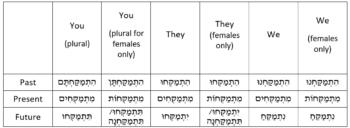Hebrew Shopping Vocabulary Posted by Ayana on Nov 9, 2021 in Idioms
הַלָּקוֹחַ תָּמִיד צוֹדֵק (the customer is always right) is a well-known slogan in the fields of commerce and service, which exhorts service staff to give a high priority to customer satisfaction (שְׂבִיעוּת רָצוֹן). לָקוֹחַ (pronounced as la-ko-ach) is a shopper in a shop, or a client that receives services.
לָקוֹחַ is the Hebrew masculine form of customer, client. For the feminine form we add the suffix letter ה – to form the word לָקוֹחָה (pronounced as la-ko-cha). Not only the Hebrew noun is changed when referring to female or male, but also the adjectives and the verbs that are applied to the noun. For example:
הוּא לָקוֹחַ וָתִיק, הוּא בָּא לְפֺה כָּל שָׁנָה.
He is a longtime client, he comes here every year.
הׅיא לָקוֹחָה נֶאֱמָנָה, הׅיא תָּמִיד קוֹנָה אֶצְלֵנוּ.
She is a loyal customer, she always buys from us.
הַלָּקוֹחַ הִתְלוֹנֵן שֶׁהוּא קִיבֵּל מוּצָר פָּגוּם.
The customer complained that he received a defective product.
הַלָּקוֹחָה הָיְיתָה מְרֻצָּה מֵהַשֵּׁרוּת. הׅיא בְּהֶחְלֵט תַּמְלִיץ לְחֲבֵרִים.
The customer was satisfied with the service. She would definitely recommend to friends.
לָקוֹחַ is one of the Hebrew nouns whose plural form is included in the list of exceptions. As a masculine word, we would expect its plural form to end with the masculine suffix. But לָקוֹחַ is one of the masculine nouns that get the opposite gender’s ending in the plural form. The plural form of לָקוֹחַ is לָקוֹחוֹת (pronounced as la-ko-chot). For example:
לְעֵסֶק חָדָשׁ לוֹקֵחַ זְמַן לִרְכּוֹשׁ אֶת אֵמוּן הַלָּקוֹחוֹת.
It takes time for a new business to gain the trust of its customers.
אֲנִי נוֹתֵן יַחַס אִישִׁי לְכֺל הַלָּקוֹחוֹת שֶׁלׅי.
I give personal attention to all my clients.

The customer’s satisfaction is extremely important, because a happy customer (לָקוֹחַ מְרֻצֶּה) will be a returning customer (לָקוֹחַ חוֹזֵר), and no business will succeed without customers. Many commercial cars in Israel printed another well-known slogan on their sides: בַּדֶּרֶךְ לְעוֺד לָקוֹחַ מְרֻצֶּה (on the way to another happy customer).
אֵין אֲרוּחוֺת חׅינָם (there ain’t no such thing as a free lunch), and every product or service costs money. Yet, customers always wish to pay less. הִתְמַקְּחוּת עַל הַמְּחׅיר (bargaining on the price) is not common in Israeli shops of daily products. There’s no bargaining on food, clothing, stationery, books, toys, etc. People do feel comfortable to ask for a discount (הֲנָחָה) when buying something big like electrical goods, furniture, vehicles, or paying on a service.
The root of the verb to bargain (לְהִתְמַקֵּחַ) is מ-ק-ח, and it belongs to banyan hitpa`el. It’s conjugated as follows:


For example:
אֲנׅי לֺא מַרְגּׅישׁ בְּנוֺחַ לְהִתְמַקֵּחַ עַל הַמְּחׅיר.
I do not feel comfortable haggling over the price.
בֶּטַח שֶׁהִתְמַקַּחְתִּי, אֲבָל הוּא לֺא הִסְכִּים לְהוֹרִיד אֶת הַמְּחׅיר.
Of course I bargained, but he refused to lower the price.
הַלָּקוֹחַ הִתְמַקֵּחַ וְקׅיבֵּל הֲנָחָה מַשְׁמָעוּתִית.
The customer bargained and received a significant discount.
הִתְמַקַּחְנוּ הַרְבֵּה זְמַן, בַּסּוֹף הִגַּעְנוּ לְמְחׅיר הוֹגֵן לׅשְׁנֵי הַצְּדָדׅים.
We haggled for a long time, in the end we reached a fair price for both parties.
Keep Calm and Learn Hebrew

Build vocabulary, practice pronunciation, and more with Transparent Language Online. Available anytime, anywhere, on any device.




